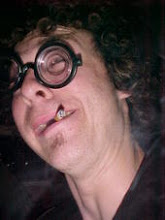 Normally I’m not all that interested in biographies, but this one is simply compelling. As much an historic account of the first half of the 20th century as a biography, American Prometheus spans nearly 600 pages and was 25 years(!) in the making. The attention to detail clearly shines through, as the book follows Oppenheimer from his early childhood in New York City to his disgrace at the hands of Atomic Energy Commission Chairman, Lewis Straus. The man that emerges is complex and somewhat contradictory. Brilliant and arrogant; warm and compassionate, and yet strangely remote.
Normally I’m not all that interested in biographies, but this one is simply compelling. As much an historic account of the first half of the 20th century as a biography, American Prometheus spans nearly 600 pages and was 25 years(!) in the making. The attention to detail clearly shines through, as the book follows Oppenheimer from his early childhood in New York City to his disgrace at the hands of Atomic Energy Commission Chairman, Lewis Straus. The man that emerges is complex and somewhat contradictory. Brilliant and arrogant; warm and compassionate, and yet strangely remote. Even as a child, it was obvious to Oppenheimer’s German-Jewish immigrant parents that their son was gifted, and so at the age of twelve he was enrolled in a special private school. Oppie (as he would be affectionately known later) was a frail and socially awkward young man. But by the time he’d earned tenure at UC Berkley in his late twenties he’d managed to right himself socially. His students, David Bohm for instance, adored him to the extent that they even copied some of his mannerisms.
Being a tenured professor during the Great Depression meant that he was, to an extent, insulated from the suffering of those around him. And yet, because Oppie was a socially conscious man, he became somewhat of a communist sympathizer in the 30’s (though he never officially joined the party and had sworn them off well before WW2). This, of course, would have dire consequences later in his life. The early 20th century was such a fertile time for physics and one of the most fascinating aspects of this book is how luminaries like Dirac, Pauli, Bohr, Lawrence, Born, Heisenberg, Fermi, swirl together through the course of this narrative. It was Ernest Lawrence who made the recommendation for the Manhattan Project.
With the successful detonation of the first atom bomb Oppie was a national celebrity, even appearing on the cover of Time Magazine. But, after the devastation of Hiroshima and Nagasaki, he became one of the most outspoken critics of nuclear weapons. When it was discovered that Soviets had the capabilities to make the bomb Oppie used his influence to the chagrin of military hawks, to make the case that the deadly technology should be entrusted to scientists world wide as opposed to the leaders of a select few countries- namely the US and the U.S.S.R. In one such infamous lecture, he more or less predicted the cold war, describing the two burgeoning superpowers as “scorpions” trapped in the same jar. Each with the power to destroy the other but at the cost of its own life.
AEC chairman Lewis Strauss was an insecure, vindictive and power-hungry man, he was also a military hawk which placed him in direct opposition to Oppenheimer. Furthermore Oppenheimer had elegantly dismissed him publicly on several occasions, regarding the need to keep nuclear secrets. Strauss was furious and set out to destroy the famous scientist with his considerable means. The time was the 1950’s and McCarthy-ism was in full swing. Strauss used Oppie’s ties to the communist party to have him stripped of his security clearance and thus barred from ever doing anything significant in government. Oppenheimer, who after the trial, was described as a “wounded animal” retreated from the spotlight with his family. He died of lung cancer in his early 60’s.
As perhaps the most high profile casualty of the McCarthy era, the fate of Robert Oppenheimer is a vivid example of the dangers of the "with us or against us" mentality.
American Prometheus: The Triumph and Tragedy of J. Robert Oppenheimer by Kai Bird & Martin J. Sherwin.
Knopf 2005
 Normally I’m not all that interested in biographies, but this one is simply compelling. As much an historic account of the first half of the 20th century as a biography, American Prometheus spans nearly 600 pages and was 25 years(!) in the making. The attention to detail clearly shines through, as the book follows Oppenheimer from his early childhood in
Normally I’m not all that interested in biographies, but this one is simply compelling. As much an historic account of the first half of the 20th century as a biography, American Prometheus spans nearly 600 pages and was 25 years(!) in the making. The attention to detail clearly shines through, as the book follows Oppenheimer from his early childhood in 












1 comment:
'ave you yet to see the "OPERAenheimer", as im calling it? --John Adams Doctor Atomic. . ThaHill saw its Boob-Tubery Debutery, as it were, a few months past. . Tha following is a Link to the Trailer, if interested:
http://www.youtube.com/watch?v=ze73QEtBcyg
Post a Comment